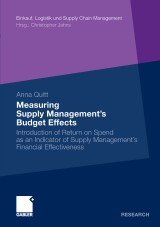Details

Measuring Supply Management's Budget Effects
Introduction of Return on Spend as an Indicator of Supply Management's Financial EffectivenessEinkauf, Logistik und Supply Chain Management
|
CHF 59.00 |
|
| Verlag: | Gabler |
| Format: | |
| Veröffentl.: | 24.09.2010 |
| ISBN/EAN: | 9783834984906 |
| Sprache: | englisch |
| Anzahl Seiten: | 250 |
Dieses eBook enthält ein Wasserzeichen.
Beschreibungen
Performance Measurement is currently one of the most talked about topics in Purchasing and Supply Management (PSM) – in research as well as in business practice. However, it is not simply a business fad; researchers already introduced the Balanced Scorecard, a performance measurement method, to PSM a few years ago. A more novel idea in this context is measuring the budget impact of PSM – its financial effectiveness. In business practice, only 10-20% of supply management’s effectiveness can be identified retrospectively in the P&L account with current measurement methods. Thus, PSM is often criticised for only being able to demonstrate its efforts on presentation charts, so-called “powerpoint savings”. Therefore, researchers were requested to support practitioners in finding a solid and feasible solution to the problem of savings measurement. The derived solution measures PSM’s financial effectiveness by integrating the function in the budgeting procedure, based on the following hypothesis: Only when supply management addresses its planned savings potential already in the budgets, it can show its comprehensive bottom line effect.
Problem Set and Course of Investigation.- Supply Management’s Financial Effectiveness – ‘The Story Behind it’.- Measurement of Supply Management’s Bottom Line Impact: Status Quo and Future Requirements.- Measurement Process Design: Measuring Supply Management’s Budget Effects – A Qualitative Approach.- Process Implementation Design: Implementing Supply Management’s Return on Spend.- All-Encompassing Final Statements.
Dr. Anna Quitt was a research assistant at the Chair of Financial Supply Management of Prof. Dr. Michael Henke and obtained her doctoral degree at the European Business School EBS in Oestrich-Winkel.
Despite its strategic focus, supply management has not yet gained due recognition for its value contribution since it can still not reliably show its effects on the corporate bottom line. Based on practice-oriented and practice-relevant research methods, Anna Quitt, therefore, designs an integrated process for measuring supply management’s budget effects and develops Return on Spend as an innovative financial effectiveness indicator. She shows that transparent savings measurement needs to start with supply management’s budgeting integration to overcome current measurement deficiencies and to establish supply management as an equal business partner.
Despite its strategic focus, supply management has not yet gained due recognition for its value contribution since it can still not reliably show its effects on the corporate bottom line. Based on practice-oriented and practice-relevant research methods, Anna Quitt, therefore, designs an integrated process for measuring supply management’s budget effects and develops Return on Spend as an innovative financial effectiveness indicator. She shows that transparent savings measurement needs to start with supply management’s budgeting integration to overcome current measurement deficiencies and to establish supply management as an equal business partner.


















